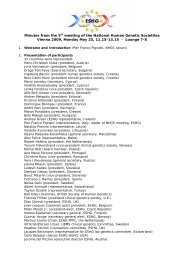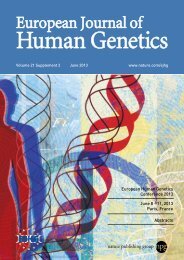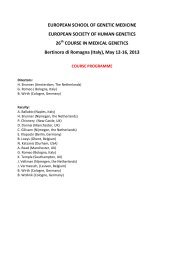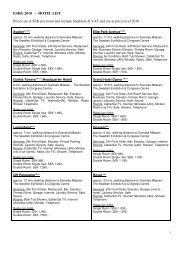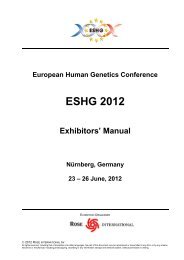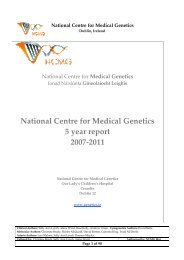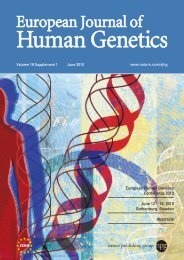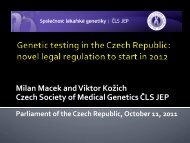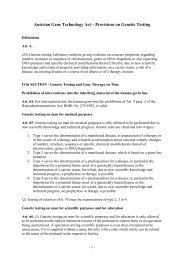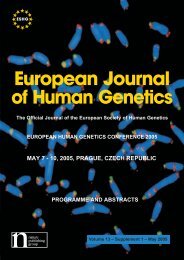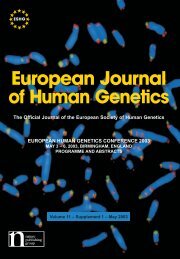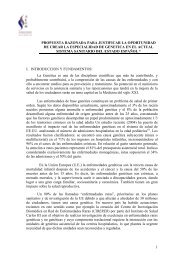2008 Barcelona - European Society of Human Genetics
2008 Barcelona - European Society of Human Genetics
2008 Barcelona - European Society of Human Genetics
You also want an ePaper? Increase the reach of your titles
YUMPU automatically turns print PDFs into web optimized ePapers that Google loves.
EMPAG Plenary Lectures<br />
Service and Medical <strong>Genetics</strong> Research Group, CMMC NHS Trust and University<br />
<strong>of</strong> Manchester, Manchester, United Kingdom.<br />
We report the results <strong>of</strong> a qualitative study <strong>of</strong> the psychosocial impact<br />
<strong>of</strong> adrenoleukodystrophy (ALD) on female carriers . ALD is an X-linked<br />
metabolic disorder with extreme variability in phenotype, including the<br />
risk <strong>of</strong> symptoms in female heterozygotes . Carrier testing based on<br />
biochemical assay is unreliable, but accurate mutation based testing<br />
has been available in the UK since 1999 .<br />
Eighteen women with a confirmed ALD gene mutation were interviewed,<br />
and the transcripts analysed using the constant comparison<br />
method . The impact <strong>of</strong> the test result <strong>of</strong>ten correlated with the timing <strong>of</strong><br />
the test, with less impact described by those who had requested testing<br />
in the mid teens, before reproduction, and more traumatic responses<br />
recalled by women who had testing at the same time as other emotional<br />
events, such as pregnancy . For the majority <strong>of</strong> women, carrier<br />
status had an ongoing impact, including feeling different and frequent<br />
intrusive thoughts . Women who had female relatives with symptoms,<br />
but were asymptomatic themselves, expressed anxiety about the risk<br />
<strong>of</strong> symptoms developing, against a perceived lack <strong>of</strong> medical understanding<br />
and treatment options .<br />
These findings add to the broader literature on psychosocial impact <strong>of</strong><br />
X-linked carrier status, and contribute new evidence that the implications<br />
for female carriers extend beyond reproduction . Genetic counselling<br />
should include discussion <strong>of</strong> the potential impact on self-image as<br />
well as living with the uncertainty <strong>of</strong> late onset manifestations in an<br />
increasing number <strong>of</strong> X-linked conditions where this is an issue .<br />
EPL6.2<br />
the marital relationship and psychological wellbeing in patients<br />
with myotonic Dystrophy<br />
R. Timman1 , A. Rotteveel2 , A. Wintzen1 , A. Tibben2 ;<br />
1 2 Neurology, Leiden, The Netherlands, <strong>Human</strong> and Clinical <strong>Genetics</strong>, Leiden,<br />
The Netherlands.<br />
Introduction: Myotonic dystrophy (MD) is characterised by progressive<br />
muscular weakness and myotonia . Other organs are involved as well,<br />
including the brain, implying, among others, mental slowness and lack<br />
<strong>of</strong> initiative, and causing problems in daily life both for patients and<br />
their spouses . Some couples seem to deal with these problems satisfactorily<br />
while others experience great trouble .<br />
Objectives: to describe the relationship <strong>of</strong> severity <strong>of</strong> MD, marital satisfaction<br />
and psychological well-being in MD-patients and their partners<br />
.<br />
Methods: 69 MD-couples were interviewed regarding the influence <strong>of</strong><br />
MD on their marital relationship, and they filled out questionnaires on<br />
severity <strong>of</strong> MD, anxiety and depression (HADS), hopelessness (BHS),<br />
and general psychological health (GHQ-12) .<br />
Results: For patients, the need for help was associated with a worse<br />
view on the future, a worse general well-being, more anxiety and more<br />
depression . For their partners, a lack <strong>of</strong> initiative was associated with<br />
a worse general well-being and more anxiety . Marital satisfaction was<br />
associated with a better view on the future for patients, and a better<br />
general well being, less anxiety and less depression in partners . It is<br />
remarkable that no less than 40 % <strong>of</strong> the patients and, particularly,<br />
female partners had BHS scores suggestive <strong>of</strong> clinically relevant depression<br />
.<br />
Conclusion: Severity <strong>of</strong> MD places a heavy burden on patients and,<br />
especially, on female partners . Marital satisfaction is a strong predictor<br />
<strong>of</strong> a better well-being, both for patients and partners, but more so for<br />
the latter .<br />
EPL6.3<br />
Living with NF1: the persectives <strong>of</strong> young people<br />
K. F. May 1 , R. A. Collier 2 , L. Kerzin-Storrar 3 ;<br />
1 West Midlands Regional Clinical <strong>Genetics</strong> Service, Birmingham, United Kingdom,<br />
2 Nottingham Regional Clinical <strong>Genetics</strong> Service, Nottingham, United Kingdom,<br />
3 North West Regional <strong>Genetics</strong> Service, Manchester, United Kingdom.<br />
Neur<strong>of</strong>ibromatosis type 1 (NF1) is a genetic condition <strong>of</strong> variable phenotype<br />
and progression, with several features (including learning difficulties<br />
and cosmetic effects) which may occur during childhood and<br />
adolescence . Previous psychosocial research on the effects on young<br />
people has largely been based on reports from parents or retrospective<br />
reports <strong>of</strong> affected adults on their childhoods .<br />
This qualitative, exploratory study was conducted by two research-<br />
ers and involved semi-structured interviews with fourteen adolescents<br />
(eight males and six females) aged 16-20 years . Analysis <strong>of</strong> the interview<br />
transcripts was performed using the constant comparative methodology<br />
.<br />
Overall, both male and female participants reported that they had<br />
coped well with being affected by NF1, and although some identified<br />
that they felt ‘isolated’ or ‘different’ to others, this had usually not prevented<br />
them from ‘getting on’ with life . Some <strong>of</strong> the older participants<br />
felt they had learned to cope with NF1 better over time, although male<br />
participants frequently commented upon uncertainties regarding future<br />
progression .<br />
The main areas <strong>of</strong> importance to both male and female participants<br />
were the challenges <strong>of</strong> talking to others about NF1, impact on education,<br />
developing friendships, relationships with parents, reproductive<br />
issues and concerns about the future . Cosmetic aspects <strong>of</strong> NF1 and<br />
employment concerns appeared more important to female participants<br />
.<br />
While further studies are required to confirm and expand these initial<br />
findings, this study adds insight into the experiences and views <strong>of</strong> affected<br />
young people .<br />
EPL6.4<br />
Quality <strong>of</strong> life in hypertrophic cardiomyopathy mutation carriers<br />
I. Christiaans 1 , I. M. van Langen 1 , E. Birnie 2 , G. J. Bonsel 2 , A. A. M. Wilde 3 , E.<br />
M. A. Smets 1,4 ;<br />
1 Department <strong>of</strong> Clinical <strong>Genetics</strong>, Academic Medical Centre, Amsterdam, The<br />
Netherlands, 2 Institute <strong>of</strong> Health Policy and Management, Erasmus Medical<br />
Centre, Rotterdam, The Netherlands, 3 Department <strong>of</strong> Cardiology, Academic<br />
Medical Centre, Amsterdam, The Netherlands, 4 Department <strong>of</strong> Medical Psychology,<br />
Academic Medical Centre, Amsterdam, The Netherlands.<br />
Background: Hypertrophic cardiomyopathy (HCM) is a common autosomal<br />
dominant heart disease associated with heart failure and<br />
sudden cardiac death (SCD) . Quality <strong>of</strong> life (QoL) was found to be<br />
impaired in symptomatic HCM patients but has never been assessed<br />
in mutation carriers, with or without manifest HCM .<br />
Methods: From approached HCM mutation carriers, 89% (n=212)<br />
completed a questionnaire . QoL was assessed using the Short Form<br />
36 Health Survey (SF-36) and the Hospital Anxiety and Depression<br />
Scale (HADS) and compared with reported QoL-data <strong>of</strong> HCM patients<br />
and the general Dutch population . Demographic, clinical and illness<br />
perception related variables were evaluated as predictors <strong>of</strong> QoL .<br />
Results: HCM carriers’ QoL did not differ from the Dutch population .<br />
Carriers with HCM had lower QoL scores than carriers without HCM,<br />
but higher scores than previously reported in HCM patients . Surprisingly,<br />
carriers without HCM scored significantly better than the general<br />
population on several QoL subscales . Best predictors <strong>of</strong> impaired<br />
physical QoL were: having symptoms (β=5.4, p=0.001) and stronger<br />
belief in serious consequences (β=4.2, p





